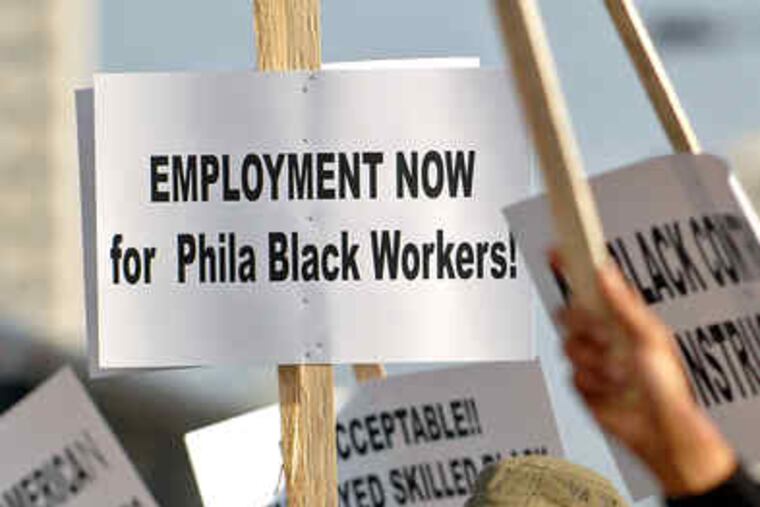Unions use a racist law on projects
Prevailing-wage measures discriminate against minorities and increase costs.

By Christopher Dodds
Since work began on the expansion of the Pennsylvania Convention Center, the city's black construction workers have protested - with good reason - over the lack of opportunities for them to participate. Mayor Nutter, unwilling to risk losing the support of unions by challenging their discriminatory hiring practices, chose instead to issue a report stating that minorities should account for 32 percent of workers on the city's large-scale construction projects.
The mayor's only means of making progress toward this goal is to give public money to unions to fund more minority apprenticeships. But this short-term response creates another cost for taxpayers while failing to address the cause of the problem: Pennsylvania's prevailing-wage law, which is excluding the non-union firms that employ the most minority workers.
Pennsylvania passed its prevailing-wage law in 1961, 30 years after enactment of its federal counterpart, the Davis-Bacon Act. Prevailing-wage laws, which set minimum wages for public-works projects in a given region, were originally passed partly to prevent black laborers from the South from taking public construction jobs in the North. At the time, union organizers testified in congressional hearings that "colored labor" was depressing wages and referred to black construction workers as "an undesirable element of people."
Because of union pressure, these racist laws have remained in effect at the federal level and in 32 states, including Pennsylvania. In Philadelphia, according to federal statistics and the Greater Philadelphia Urban Affairs Coalition, minorities today account for only 8 percent to 20 percent of construction workers on large-scale city projects. Seventy percent of these workers do not live in Philadelphia.
The AFL-CIO has responded to Mayor Nutter's criticism by noting that the city's unions often bring workers in from areas outside the city, such as Delaware and southern New Jersey, where there are not as many black workers. So, instead of preventing black workers from out of state from taking public construction jobs, unions are now importing workers from other states to prevent Pennsylvania's black laborers from working on projects. The law was racist when it was passed, and it is still racist today.
In the past 30 years, 10 states have repealed their prevailing-wage laws. In these states, 60 percent of the difference in wages between black and non-black construction workers has disappeared, studies have shown. On average, wages for black construction workers in these states have increased 5.5 percent.
Black construction workers in non-prevailing-wage states not only receive higher wages; they also have more job opportunities. And black workers have more difficulty finding work in states where organized labor is strong. Between 1980 and 1990, black employment in the construction industry fell 11 percent in prevailing-wage states; in those without prevailing-wage laws, the decrease was limited to 2 percent.
Prevailing-wage laws also make public works needlessly expensive. Although Pennsylvania's law intended the prevailing wage to be determined by a number of factors, in practice it is simply set at union rates.
As a result, the labor costs for public-sector construction jobs in Pennsylvania are an average of 37 percent higher than what the private sector pays for the same work. In Philadelphia, which has its own prevailing-wage law on top of the state's, public-sector work is 44 percent more expensive. This adds a premium of a little more than 20 percent to the cost of every taxpayer-funded construction project.
The Convention Center expansion was budgeted at $700 million. Even if the project had stayed within that budget, taxpayers would be out an extra $140 million, thanks to the prevailing-wage laws.
Philadelphia taxpayers are being forced to pay more for construction projects to achieve racial diversity, when that result could be achieved much more effectively - and with substantial savings - by getting rid of the prevailing-wage requirement. Nutter and state lawmakers should stand up to the labor unions and support the city's black construction workers, as well as the rest of its taxpayers.